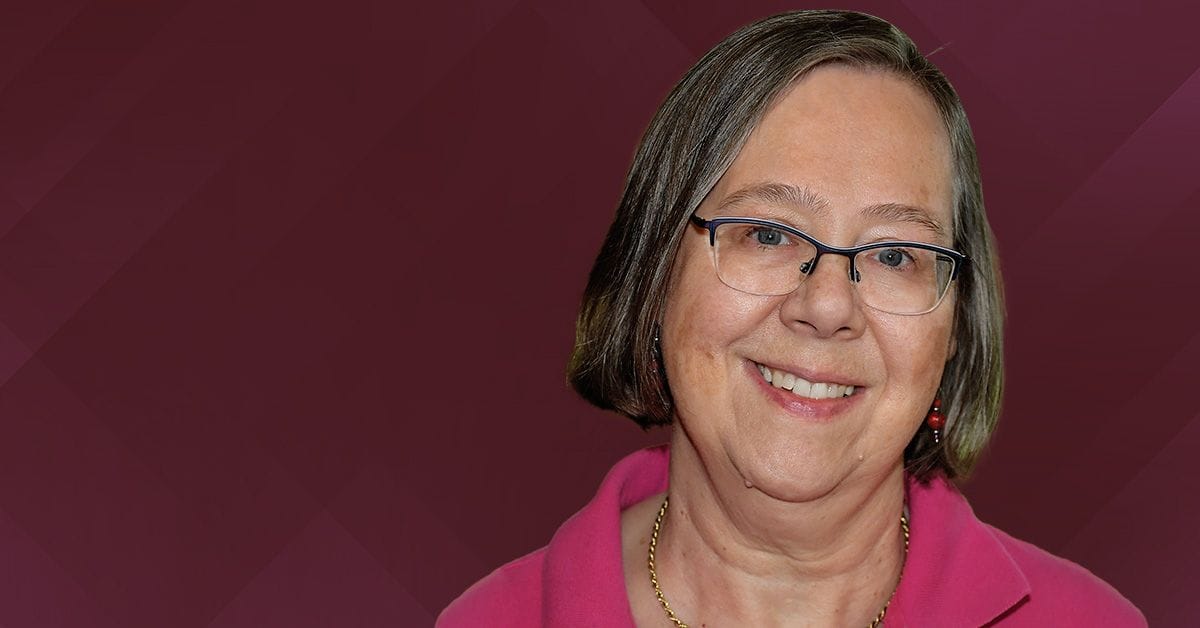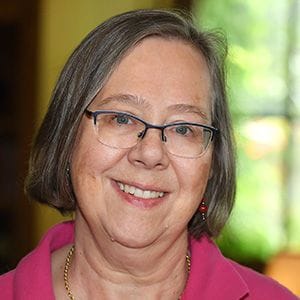In this interview, Sue Cardinal shares insights on her role as an experienced STEM librarian, how discussions surrounding open access have evolved over the years, and the importance of how data is shared alongside a research article.

As part of an ongoing series here on ACS Axial, we’re interviewing authors and librarians from around the world to find out more about their research, their published work, and the impact that open science is having on a changing landscape of research communication. This time, we're speaking with Sue Cardinal, STEM Librarian at the University of Rochester.
...if more research is available through OA, it's at [researchers'] fingertips, and digging into other people's data will help gain new insights.

Hello, Sue - could you tell us about your role at the University of Rochester?
I'm an experienced STEM librarian, in the Research Initiatives department. I work at Carlson Science and Engineering Library, which is part of the River Campus the University of Rochester. I work with several departments: I'm a liaison librarian with the chemistry department—hence my involvement in ACS—and I also work with the chemical engineering and material science faculty. Most recently I also became the interim library contact for earth and environmental sciences.
The main things that I do are the same across the disciplines: getting to know the faculty and students, and selecting information that they would benefit from—that could be subscriptions or eBooks—and then promoting the resources that we have. There's always turnover in the student body, so there's a constant need to run awareness campaigns about the resources we provide access to, and making sure students and faculty know they don't have to pay for too many things.
What does the average day look like for you?
A lot of it is spent reading email, Teams messages, and just keeping in touch with people through virtual methods. A typical day would also involve several meetings. It could be professional development, or it could be teaching a class or updating colleagues on what I'm up to, and learning what they're up to, and trying to work together. Sometimes I attend seminars and meetings of my liaison departments.
The hot topics right now for me are artificial intelligence, and universal design for learning. Those are the things that I'm focusing on in my professional development.
When did you first hear the term 'open access'?
I might have heard the term before this point, but I feel like the big epiphany for me was at the Spring 2005 ACS Meeting. There was a session about the cost of journals and the serials crisis, which had been a topic of discussion for a long time before then, but suddenly there was a feeling that open access (OA) might be the solution. Once we understood the principle of OA, it got us thinking about if the costs for publishing could be shifted somehow.
This was while we were still transitioning to an electronic world, and so in my mind, at least initially, I was thinking things like distribution costs should go way down. Then, of course, we discovered that there is a significant cost of producing the version of record, however it's distributed, and that online distribution isn't free—we save on the costs for printing and mailing physical copies of journals, but instead we're using servers and other infrastructure that needs to be purchased and maintained. The costs still exist.
So then discussion shifted from "this is going to be wonderfully free" to "who's going to pay for this, and how much is it going to cost?"—and I think that's the discussion we're still in right now. We don't want the readers to have to pay for access, and until then libraries had been paying to subscribe to journals on behalf of the readers. With OA, the subscription part of it goes away, but someone has to still pay the cost. And so we're talking about whose lap this cost falls into: is it authors, institutions, grant funders, or a combination? It becomes a much more complicated question at that point, a logistical challenge that we're still working out the details for.
Your institution joined an ACS read and publish agreement in 2022. What do you think the rationale was from your institution's perspective?
We were discussing it during Covid, because I know I was working from my home office when we were talking about it, so we might have been discussing it for a year or so beforehand. I would say that there were several reasons that we really thought that OA was a good choice: firstly that we wanted to share Rochester publications more openly, but there were some barriers in the form of article publishing charges (APCs) which authors don't always have access to: their research budgets typically go on paying their grad students and their postdocs, reagents, equipment, and so on. We wanted to help our researchers meet the requirements that the Federal funders have been putting on them to make information available to taxpayers and international scientists.
Beyond that, we're really hoping for a more equitable and sustainable future. The combination of Black Lives Matter protests after the murder of George Floyd and pandemic lockdowns and social distancing made me think about equity in a new way, and more generally made a lot of institutions try to figure out how to overcome the financial and digital equity barriers that many are facing. We're looking at how we can disseminate information as widely and equitably as possible, so we like the idea of this transformative agreement that would hopefully share Rochester research more widely—and we were hoping other schools would also join in, so that we could gain access to research more openly in kind.
One of the things I really like about our agreement with ACS is that it covers our researcher’s publishing costs in both fully OA and hybrid journals—not all publishers’ OA agreements are alike in that regard.
What do you think are the biggest recent developments in open science and open access?
I think it revolves around data. Funders are requiring, or placing high expectations, on authors to provide their data along with their articles. When I first mentioned this to our chemists, they said that the data is included in their paper, or in the supplementary information—but that tends to be a PDF, and it's locked down. People want the full data so that they can combine it with other data and do some new analysis, or dig into your research and critique it. I think that's the new thing, we're really trying to increase reproducibility and we're providing data that can be used in other people's research. We've hired a reproducibility librarian to assist our researchers in developing best practices, and we're subscribing to an electronic laboratory notebook and encouraging publication of methods. Pulling all of this together means that if people are curious about the research and they want to dig into it, all that detail is available and they can learn a lot more from it.
Where do you think open science will be in the next 10 years?
Let me get my crystal ball out...! I tend to be pretty ambitious when I think to the future, so don't hold me to a timeline—and then this is my vision only—but I believe that subscriptions and paywalls around research are going to go away. I don't know if we're going to make it there within a decade, but there are some publishers which are stating their intentions to fully switch over to OA in the near term. So then we're going to have this new economic model—and it's likely not going to be with the authors. I think the institutions and the funding agencies are the ones that are going to figure it out, but I have a feeling it will fall to the institution.
I also believe that preprints are going to continue to grow in importance. They're definitely growing in chemistry, and I think that will continue so that people can have faster access to research, even before it's peer reviewed, and as a result global collaboration may increase as people have access to more and more information. Our researchers are already doing some co-authoring for sure: a lot within the United States and Europe, and I imagine that will continue to increase, and with that I think the focus is going to shift to some of the big worldwide issues like climate and health. Look at what happened with Covid research: it's all hands on deck, everyone contributes, and all the research is valuable, and our experts with the top skills are going to be leading the way.
I also think that citizen and self-taught science may flourish. I know that here in the US, homeschooling is definitely a strong thing, and during Covid it increased. Having all of these articles out there is going to enhance that.
I also think interactive multimedia is going to be more of a thing. We've been talking about changes to the concept of an 'article' for a while, and the next generation of researchers is really invested in video content—I have a teenage son and video is his life, he consumes so much video content, and everyone has phones now which makes creating it easier. I can imagine that that's going to be part of the methodology in the future— producing videos that document exactly how you're doing a procedure. We already have some like initiatives like the Journal of Visualized Experiments that are doing video-oriented articles.
Finally, I think the peer review process is also going to be augmented with artificial intelligence. There may be some basic things that a computer algorithm can do—ingesting the article draft and determining if certain things are included, that the writing looks adequate, handling basic translations, things like that—but in the end humans will need to read and sign off on the results, because we've learned that AI is not perfect (as discussed recently in Nature) and there can be a lot of issues that require a human supervisor. The powerful thing is that taking some of these tasks off our researchers' plates will free up their time to design more elegant and creative research proposals and experiments. And if more research is available through OA, it's at their fingertips, and digging into other people's data will help gain new insights—it's not just about the articles.
Finally—if you hadn't chosen your current career, what would you be doing?
One of my great loves is music, and I love to help people. I think music therapy or musical entertainment could be a lot of fun…I don't want a highly critical audience, however, so maybe a musical therapist in a nursing facility? That strikes me as a warm, fun place to be, in some respects, with a very accepting audience of encouraging people. I could see myself traveling from place to place and doing that! As we've been discussing artificial intelligence, I do think about how it's going to affect librarianship—there may be some ways in which part of the work we do can be replaced by AI agents that will free us up to do other things. The question remains, what those other things will be!
Check out the other interviews in this series:
Ian Cousins, Stockholm University
Hongxia Duan, TU Eindhoven
Vojtěch Vaněček, Institute of Physics, Czech Academy of Sciences
Louise Otting, TU Delft
Kristine Horvat, University of New Haven
David W. McCamant, University of Rochester
Fernando Sartillo Piscil, Benemérita Universidad Autónoma de Puebla
Lillian Chong, University of Pittsburgh
Rubén Mendoza-Cruz, Universidad Nacional Autónoma de México
Alison Bradley, Partnership for Academic Library Collaboration and Innovation
Vesna Srot, Max Planck Institute for Solid State Research
Matt McDowell, Georgia Institute of Technology